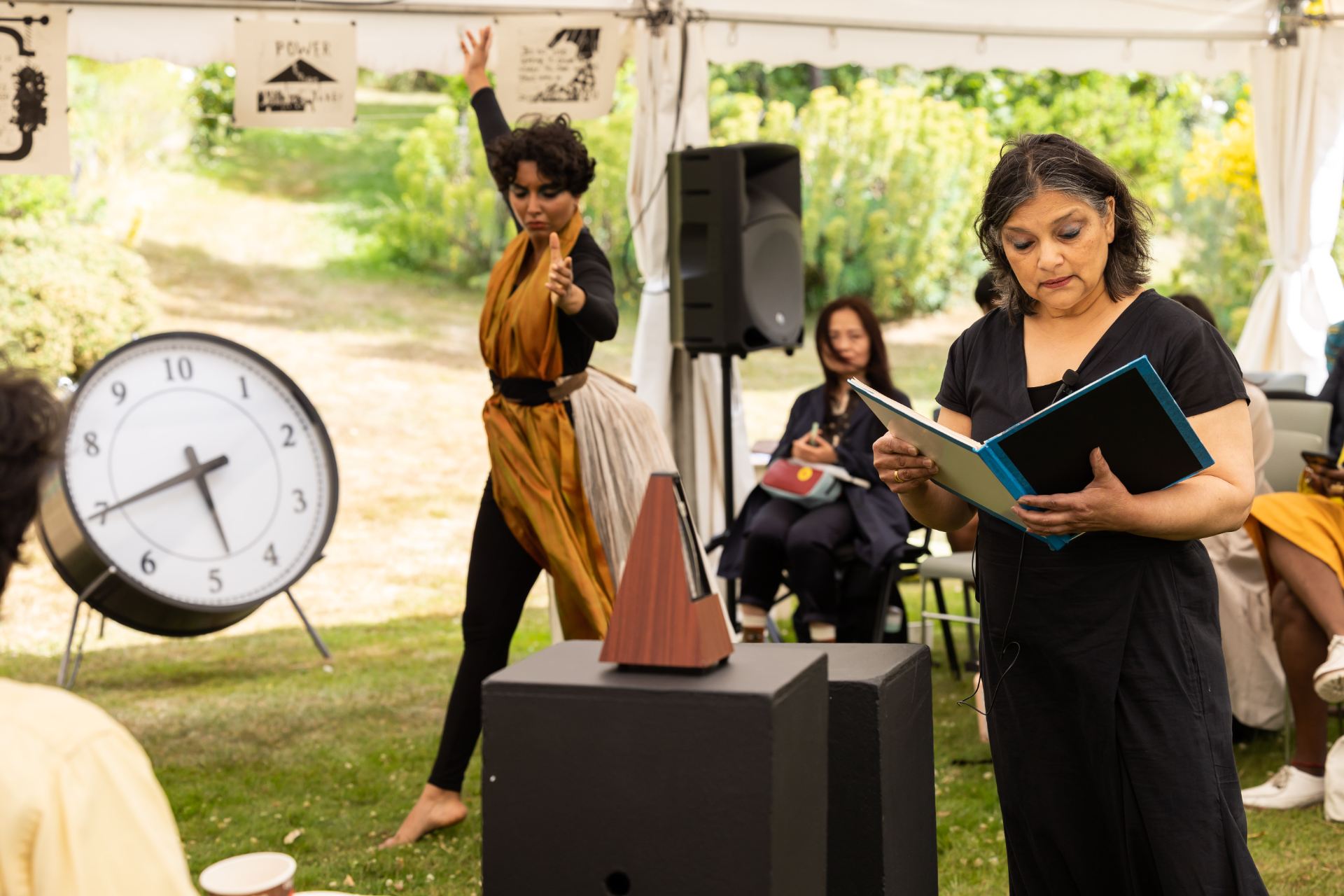A report in images by Curatorial Assistant Peter Amoore.
On 25 June Cooper Gallery held a gathering at University of Dundee’s Botanic Garden around the intention of re-imagining what art education could be, questioning who it currently serves and how ways of learning together could be opened up to more equitable possibilities for knowledge production and exchange.
The event is part of Cooper Gallery’s major ongoing programme which has brought to Dundee leading international artists, academics, curators, musicians, thinkers and writers.
This 12-hour gathering of open-air conversations, dance, music, performance, readings, screening, workshops, and food, drew on strategies, models, provocations, reflections and questions from artists, musicians, dancers, curators, educators, learners, collectives, cooks, filmmakers, participants, attendees and the gardens themselves.
The day involved deep listening through movement and poetry; sharing open questions; hearing suppressed stories through live music; talking art school futures and manifesting ideas for them; sharing gifts for lunch; rehearsing and workshopping together; taking two steps forward and one step back in a participatory performance; sharing notes on anxieties, historic experiments and experiences of arts education and informal peer learning, design and botany; singing together and engendering and the intimacy of the studio; talking educators past and present; rapping, watching and dancing among much more.
It has been a privllege to work with the esteemed figures who presented on the day. Including: Sam Ainsley and David Harding, who established and led the influential Environmental Art course at Glasgow School of Art which produced many Turner Prize winners and nominees; Prof. Regina Bittner, Head of the Academy and Deputy Director at Bauhaus Dessau Foundation; Gudskul, the educational platform of Jakarta-based artists collectives ruangrupa, who are curating the 2022 edition of Documenta15, a hugely significant contemporary art event that sets the tone of the artworld for the next five years; Serubiri Moses, a Ugandan curator based in New York who was one of the curators of the 10th Berlin Biennale an exhibition which changed my understanding of contemporary art; Kapil Seshasayee, a celebrated Scottish-Indian musician whose work was lauded by The Guardian as “one of the most promising debut albums to come out of Scotland in recent years”; Jemma Desai whose recent writings have made major impact on the art sector; Ross Sinclair, a long-established artist and alumni of Environmental Art course at GSA who is now a professor of Contemporary Art Practice at GSA; and critically recognised artists Barby Asante, Hardeep Pandhal, and more.
The event also screened O Horizon, a feature-length film by Turner Prize nominees, artists collective The Otolith Group, which reflects on the poetry and experimental teaching techniques of Bengali polymath and the winner of Nobel Prize for Literature Rabindranath Tagore.
Working on this project has introduced me to provocations and challenges and inspiration. To take responsibility for my part in change I’m listening for what will grow from the seeds of this project.
For now, here are a series of photos that give glimpses of moments within a very special day that engaged our full senses – from the scent of the gardens; the taste of food prepared and gifted with generous intent; the feeling of being guided to move two steps forward, one step back crunching over leaves, twigs and mosses; and listening to provocations, questions and music.
Ranjana Thapalyal with Hamshya Rajkumar, SOUND-SEED. Performance
The day opened with a performance of movement, stillness, and visual listening evoking Vak, the originary source of speech and language in Indian philosophy by artist, writer and educator Dr. Ranjana Thapalyal with artist and dancer Hamshya Rajkumar. Hamshya’s dance drew attention to her movements and the sounds of the glass houses, pools of water and the temperature, leading us out into the marquee where Ranjana read text reflecting on the power of speech. Setting an intention to listen and consider our movements, surroundings and the double edged power of speech, its ability to inflict violence as well as express love.
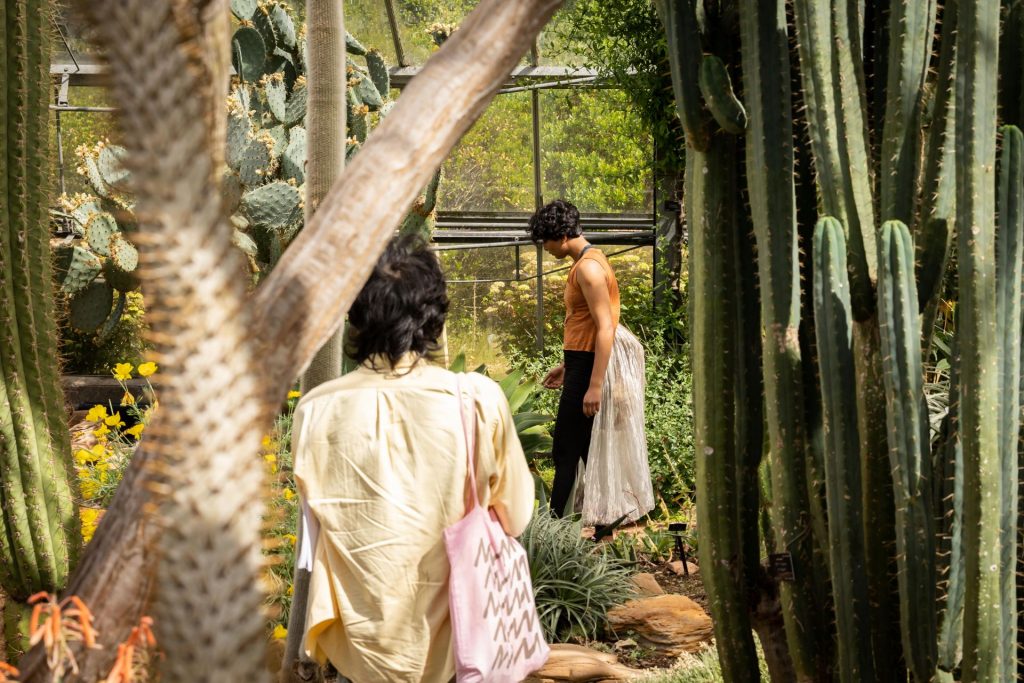
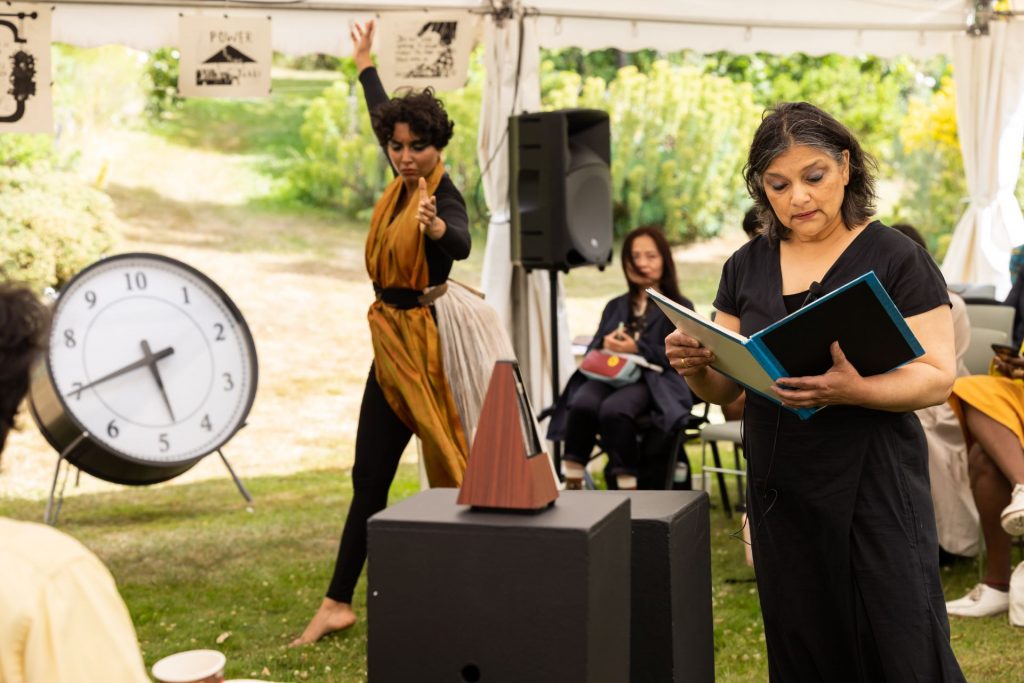 Jemma Desai & Barby Asante, As We Are Giving We Are Receiving.
Jemma Desai & Barby Asante, As We Are Giving We Are Receiving.
Inspired by the work of Bayo Akamalafe who emphasises that “good questions transcend the answers we can give them”, Jemma (film programme, researcher and writer) and Barby (artist, curator and educator) were in-conversation as ‘dialogic containers for one another, seeking not to build an argument or to come to a shared conclusion, but to fill up with the receipt and embrace of the question, to integrate the power of seeking without the entitlement to find’. From what I witnessed, this reciprocal relationship and openness to questions set a tone for the way people participated in each other’s ideas, works and conversations, resonating throughout the day. This approach towards uncertainty feels like an important method for being with others and ‘staying with the trouble’.

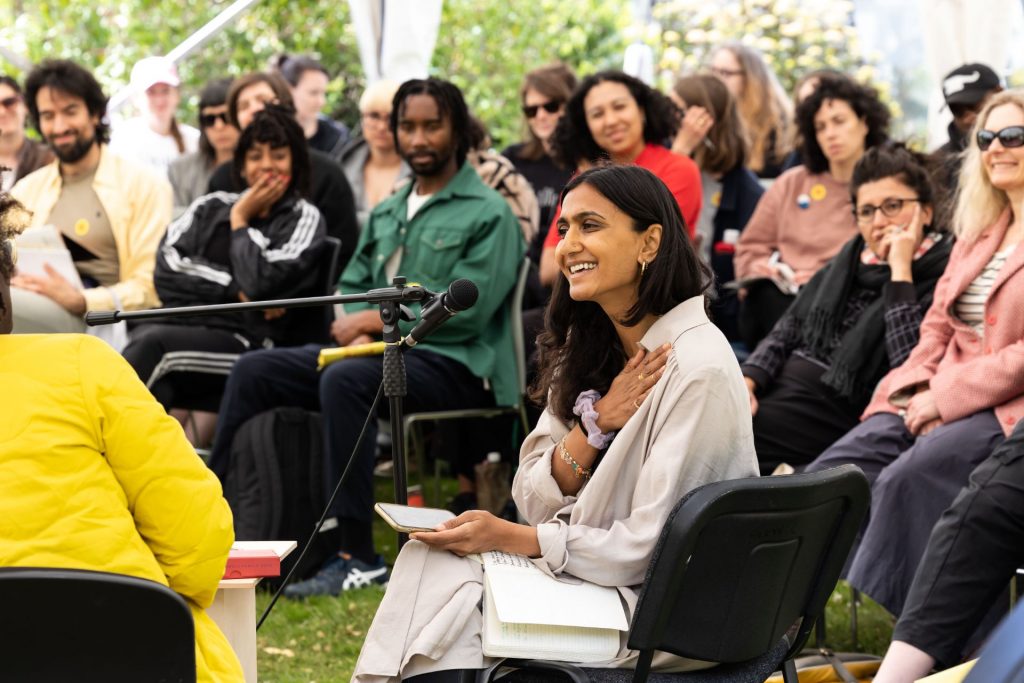 Kapil Seshasayee Live Music
Kapil Seshasayee Live Music
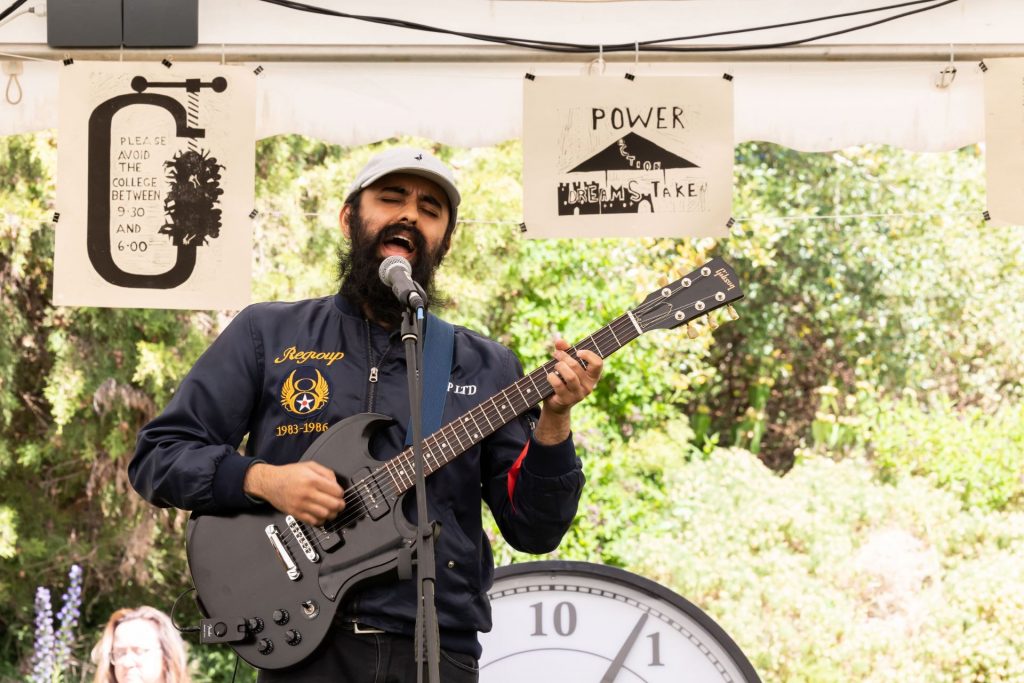 Musician Kapil played songs from ‘A Sacred Bore’, a concept album about the oppression of the Indian caste system both in Indian and its diaspora. Kapil talked between songs about their meaning and the ways education reproduces these ideologies. Kapil performed flanked by protest posters from the Hornsey School of Art Sit-in from 1968.
Musician Kapil played songs from ‘A Sacred Bore’, a concept album about the oppression of the Indian caste system both in Indian and its diaspora. Kapil talked between songs about their meaning and the ways education reproduces these ideologies. Kapil performed flanked by protest posters from the Hornsey School of Art Sit-in from 1968.
A Future Art School
Roundtable Discussion by artists and art school graduates Saoirse Amira Anis (DJCAD), Frances Lingard (GSA), Laura McSorley (DJCAD) & Undine Sellbach (Senior Lecturer in Art & Philosophy at University of Dundee).
Each panellist presented on ideas of arts education followed by a discussion where Undine asked those of us sitting to turn to another and ask each other our thoughts on a future art school. Saoirse read Haiku poems talking about the whiteness of the institution of education and her desires for a more fluid, intimate arts education. Laura echoed this desire for intimacy calling for an erotics and sensory education, after which she invited the rest of the panel to eat her notes which were written on rice paper. Frances Lingard showed examples of networked and collective learning to draw strategies and inspiration from while Undine asked us to consider our relationships with the extra-human and what we can learn from an attention to the organisms which constitute our surroundings.
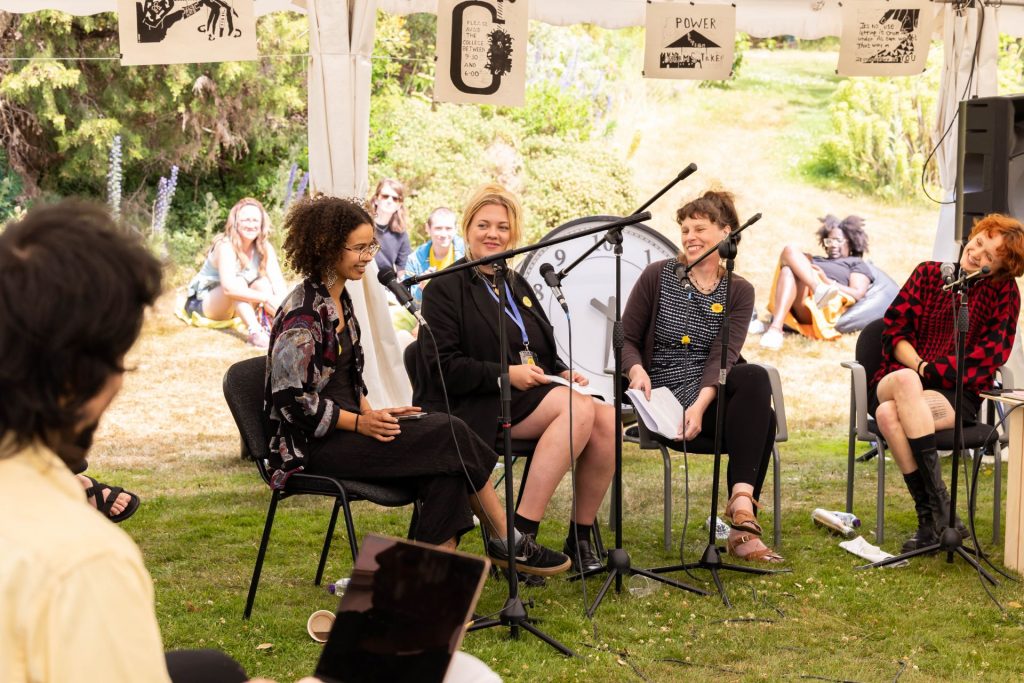
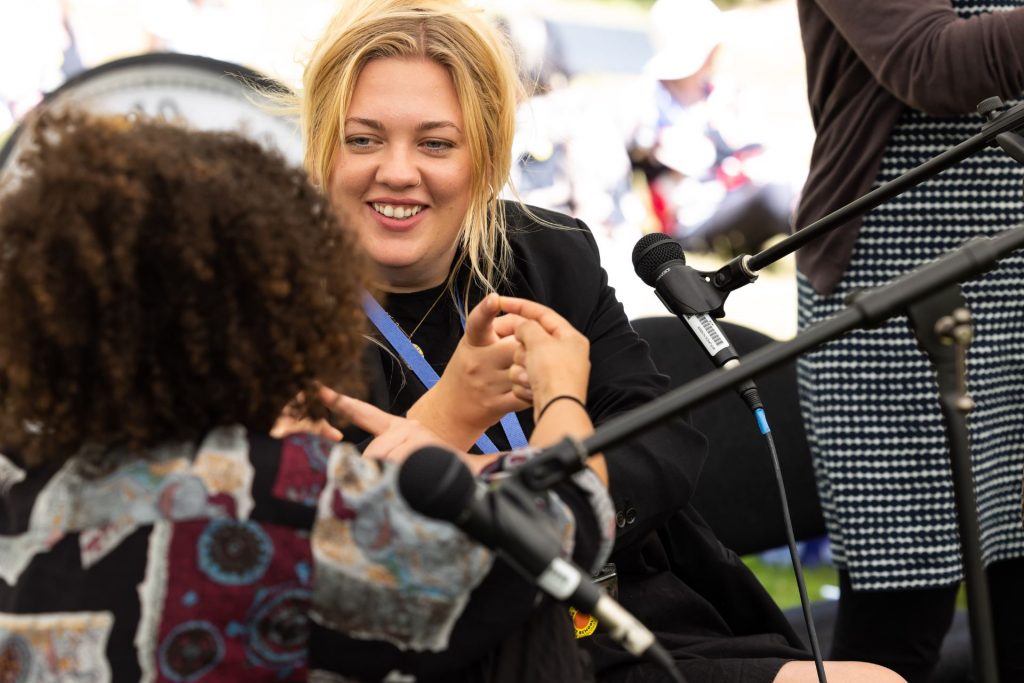 Inda Johnston & GUDSKUL
Inda Johnston & GUDSKUL
Lunch by Inda Johnston (chef at Dundee Botanic Café) with a menu devised by Jakarta based education collective GUDSKUL. With incredible generosity chef Inda Johnston presented a Tumpeng with a blessing for those attending. Inda had heard of the gathering and wanted to contribute. Her food was incredibly delicious.
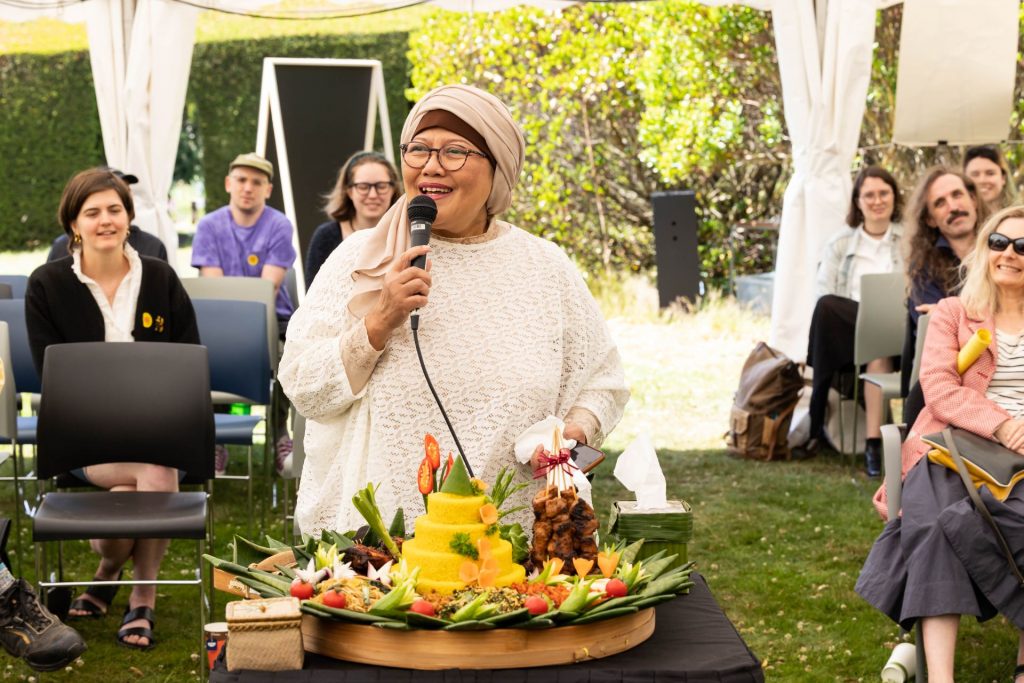
Ashanti Harris with Mele Broomes
An Archive: The Rehearsal
Artists and dancers Ashanti Harris and Mele Broomes, walked us into a wooded area of the garden shaded by tall pine trees. Through a recording on a portable PA, music and Ashanti’s voice guided us to place one foot in front of the other, taking two steps forward then one step back. Throughout this participatory performance, our movements were guided while Ashanti and Mele performed movements, rests and connections with each other. Their work addresses the ‘moving dancing body as a repository of incorporated histories; a transformative archive which can only be accessed through the physical teaching and sharing from body to body.’ The symbolism of this performance echoed hard throughout the day.
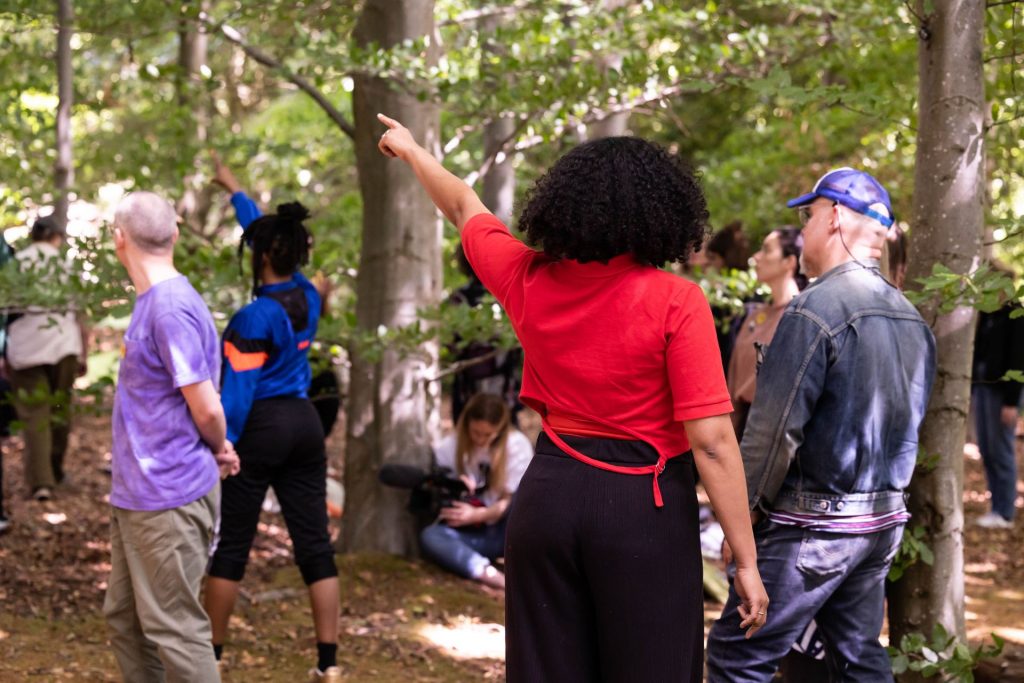
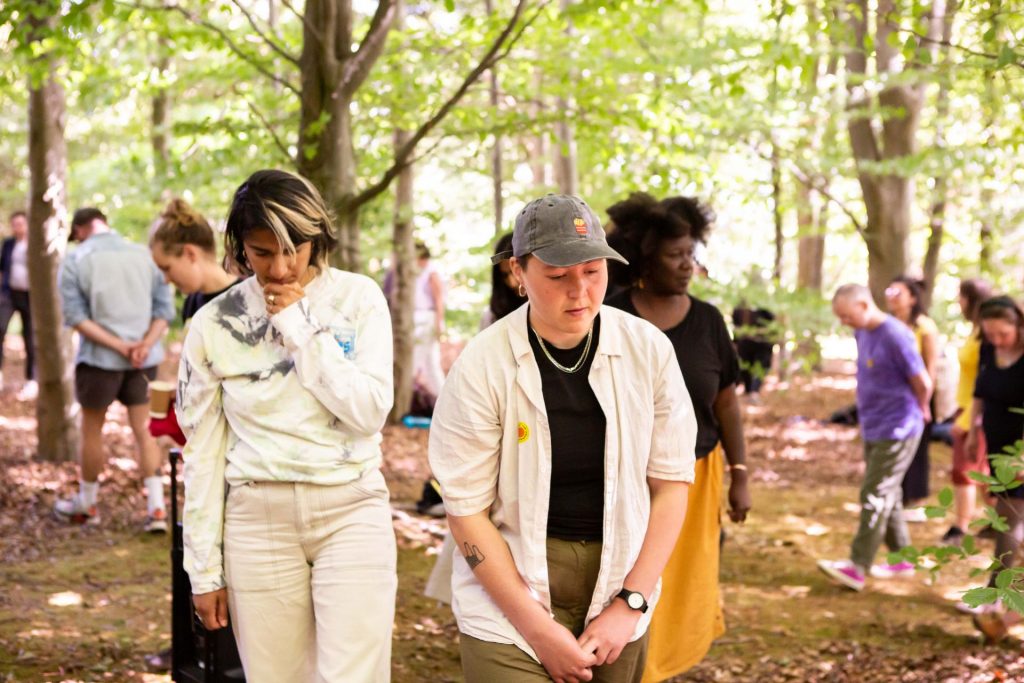
Serubiri Moses & Awuor Onyango
Further Notes on Anxiet(ies)
Talk
Curator Serubiri Moses and artist Awuor Onyango zoomed in to discuss The School of Anxiety, an itinerant unteaching environment organized within the context of the 10th Berlin Biennial of Contemporary Art (2017-2018).
They discussed the methodology and the Nairobi chapter of the project. Focusing on site visits to Kenya’s Independence grounds; Uhuru Park, and Freedom Corner inside it, as well as the War Cemetery, Moses and Onyango examined how the project was shaped by curatorial pedagogy methods, curricula and autopoiesis.
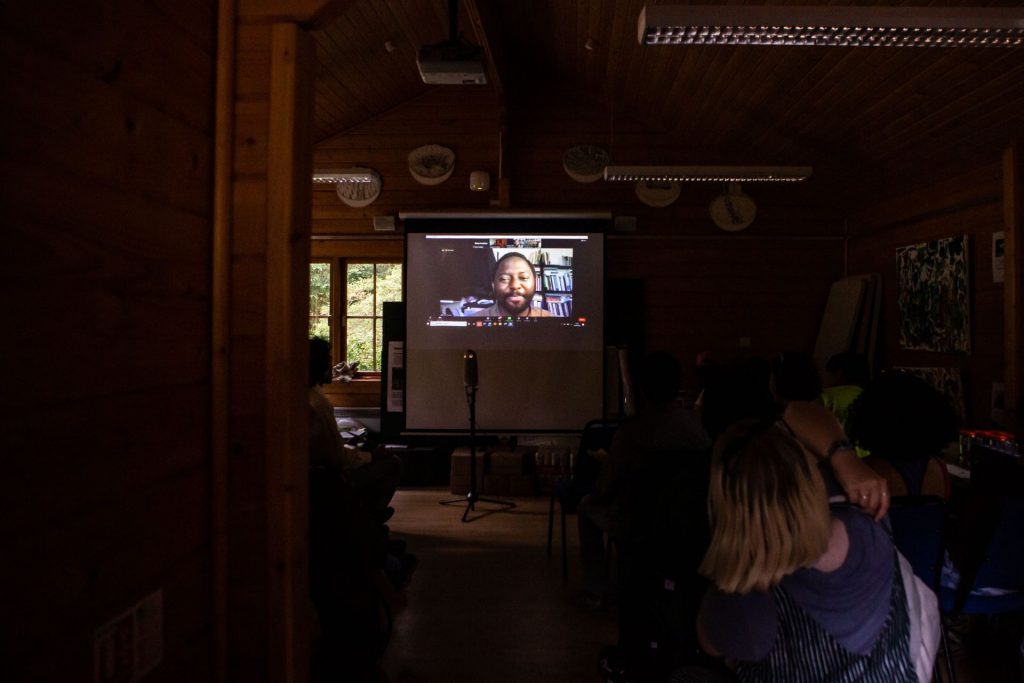
Regina Bittner
Bauhaus Plants: Modern Botanizing
Talk
Regina (Head of the Academy and Deputy Director of the Bauhaus Dessau Foundation) talked about sketches in the Bauhaus by the Bauhaus student Reinhold Rossig, which he drew in response to the exhibition of Karl Blossfeldt’s Urformen der Kunst at the Bauhaus Dessau in 1929. The popular neo-objective plant photographs stand in the context of a discourse that ascribed to modern media the ability, according to Moholy Nagy, “to make visible the stream of life inaccessible to mere perception.” The talk followed the trail of this “new seeing” of the inner rhythms explored at the Bauhaus Dessau, in which knowledge of the body and the senses was demanded in a new way, and discusses the inherent paradoxes of this modern idea of the unity of life forms between nature, technology and art.
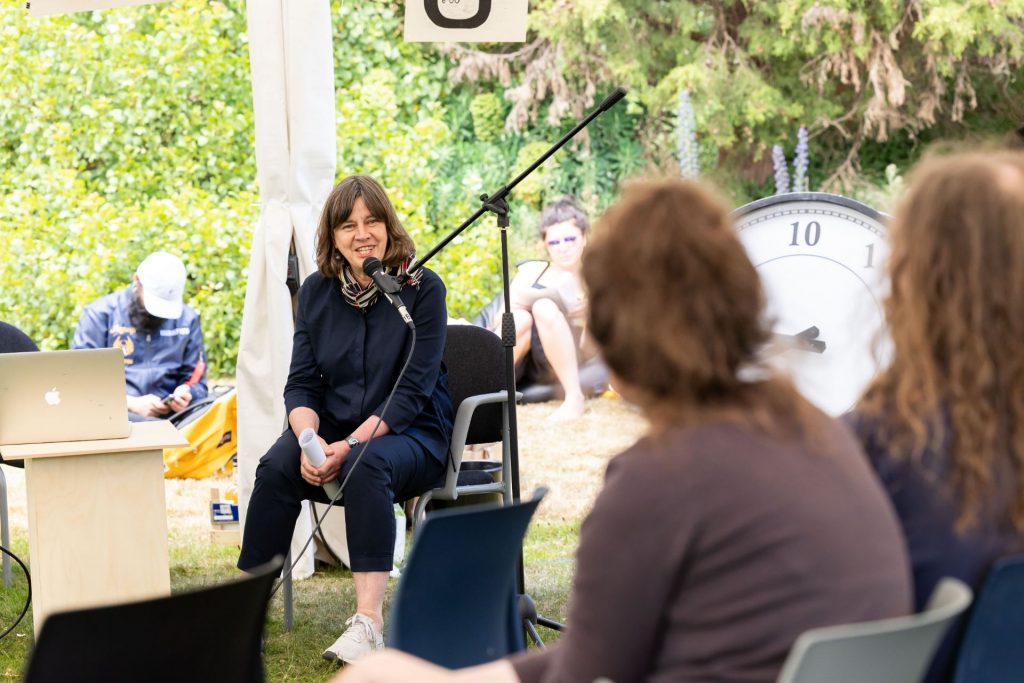
GUDSKUL
Pasar Ilmu (Knowledge Market)
GUDSKUL member Angga Wijaya facilitated the Jarkarta based education collective’s signature workshop which they have conducted in many iterations around the globe. The workshop invited participants to pick a partner they don’t know, sit down together. After the pairs are set, one takes on the role of ‘teacher’ by teaching whatever they want to the other, who takes on the role of ‘student’. GUDSKUL’s research is about supply and demand in knowledge: how strangers meet each other, start conversations, and through this gain new knowledge – a model they apply to the production of performative work. It was joyful watching contributors and attendees joined together for this open sharing of knowledge and experience.

Sam Ainsley, Anne-Marie Copestake, David Harding, Peter McCaughey & Ross Sinclair
On Singing
Talk and Singing
Colleagues of Environmental Art and the MFA at Glasgow School of Art gave a flavour of what it was like where informal singing added an extra ingredient to the education of art students. ‘Singing as shared fun and heightened experience. Singing as a personal or group performance. These unplanned, informal events created some memorable high points of interaction between staff and students and between students themselves.’ The intimacy and closeness of the GSA studios could be heard and felt asking us to reflect on the importance of the unscheduled/impromptu situations which are vital for education to flourish within.
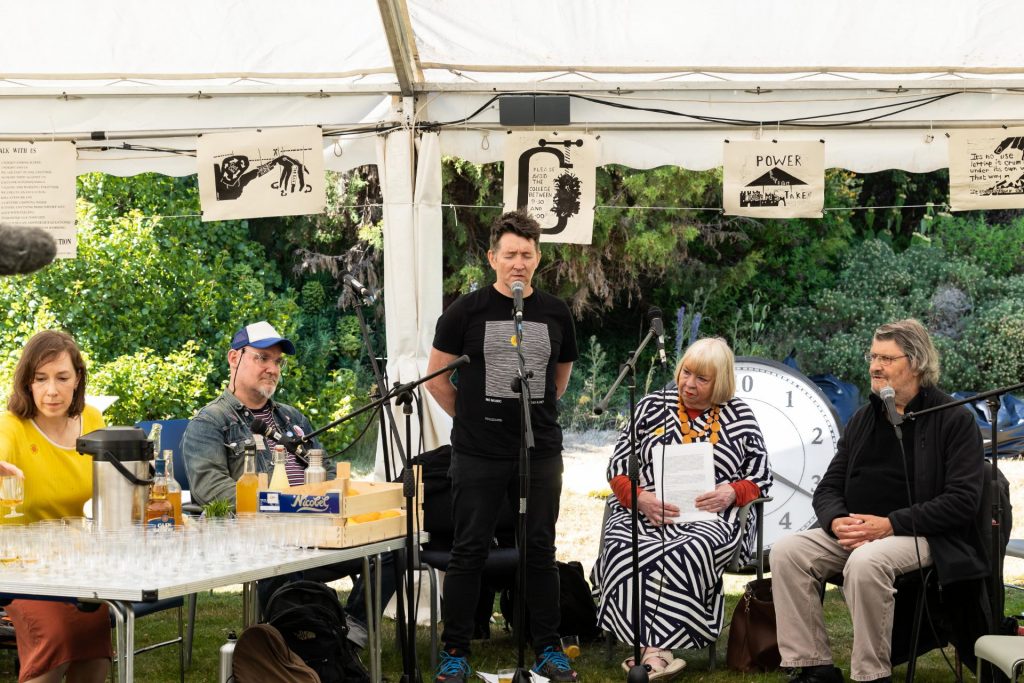
Grant Watson
Resist Dye
Talk and Discussion with Ranjana Thapalyal
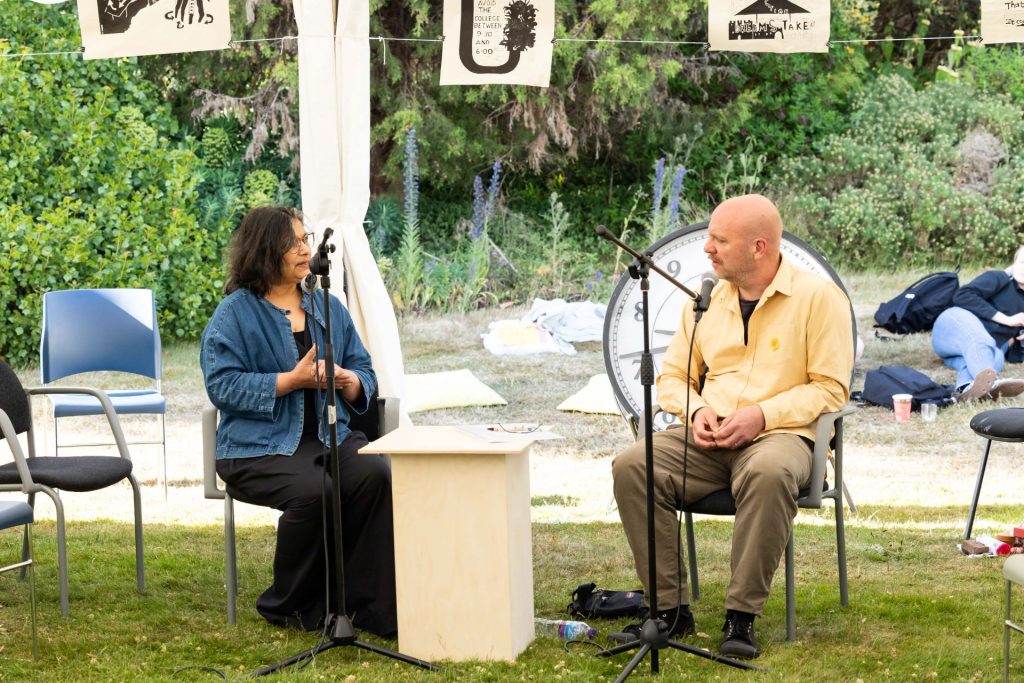
Working on an event like this meant I didn’t hear all the presentations, as I was moving behind the scenes to check the running of the day was in order. I’m keen to watch the video recordings of the talks especially this by curator Grant Watson and artist, writer and Educator Ranjana Thapalyal.
This is the abstract for the talk:
In 1927 Indian poet Rabindranath Tagore visited Indonesia to research ancient civilizational links and encourage exchange. Tagore’s visit was choreographed by the colonial authorities who, concerned that it might incite the nationalist rebels, warned him to stay out of politics. Tagore’s principle aim though, was to gather resources for his university and art school at Santiniketan, both financial and artistic. In the latter he was aided by the artist Surendranath Kar, who took photographs, made sketches and gathered information about Indonesian arts and crafts. Witnessing a demonstration of resist dyed batik textile production and being gifted examples, on their return, batik was incorporated into the school’s curriculum, and promoted as a tool for rural regeneration through the work of the Institute for rural Reconstruction at Sriniketan. Briefly addressing this history, the talk will look at how textiles played a transcultural role as well as political one, through utopian ideas about arts and crafts, education reform, and cultural renewal as part of a wider project of decolonization.
Hardeep Pandhal and Joe Howe
MIDIevil x Spider Knife
Rap
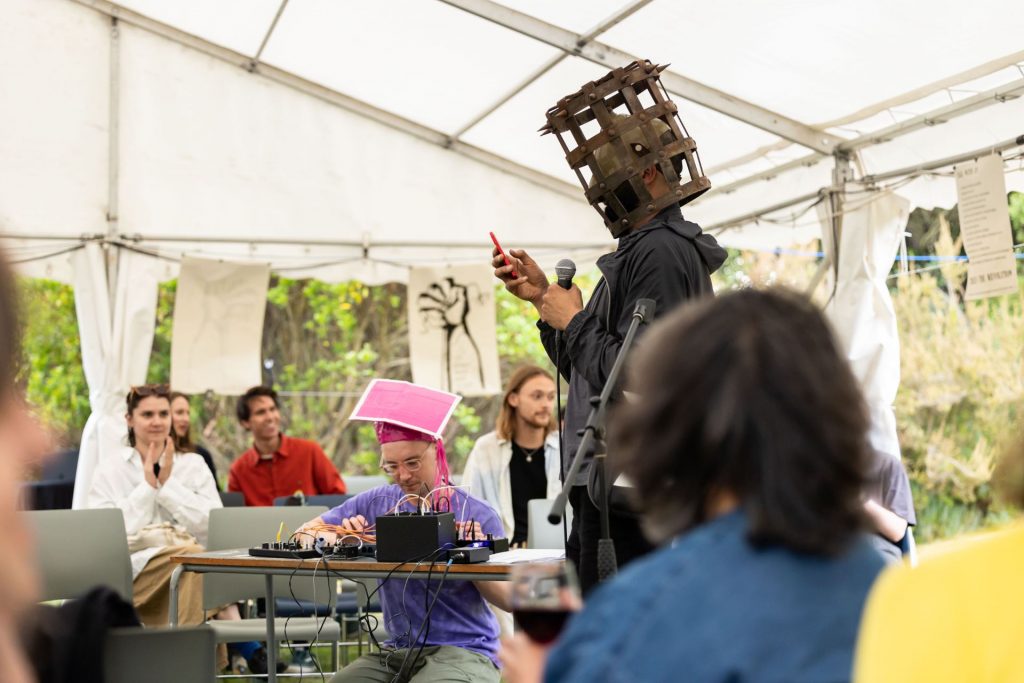
For the first time artists Hardeep Pandhal and Joe Howe performed as their alter egos MIDIevil x Spider Knife live. You had to be there! But hear previous song recordings here: https://www.hardeeppandhal.com/midievil-unplugged/#
Adam Benmakhlouf
Amdram
OpenAmateur Dramatics Rehearsals by artist and DJCAD PhD candidate Adam Benmakhlouf and participants.
After a dinner of curry served in the glass houses Adam gathered participants who had been taking moments between presentations and breaks to workshop a script they had prepared on the politics of collaborating and learning together. The group gathered in a circle reading this play, bringing their experiences as well as fabricated characters and accents to their retellings of the kinds of recurring communication breakdowns, calls for support, and joyful exchanges that take place in collective endeavours.
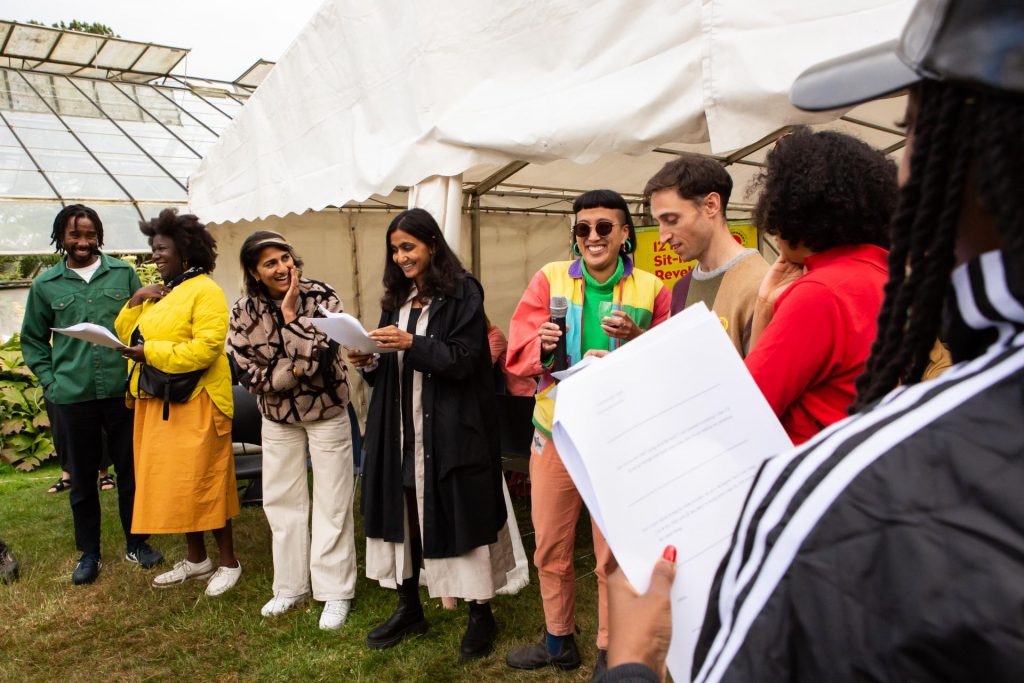 The Otolith Group
The Otolith Group
O Horizon (2018)
Film
The Turner Prize nominated Artist collective the Otolith Group’s film O Horizon was screened in a warehouse at the far side of the botanic gardens meaning we walked the distance through the trees and plants, taking in a chance to breath before watching this focus on Visva-Bharati, a modern school founded in 1921 by Nobel laureate Rabindranath Tagore, the cosmopolitan polymath who shaped Indian art, literature, music, and education. Filmed, recorded and researched over
five years in Santiniketan, West Bengal, O Horizon stages moments from Tagore’s environmental pedagogy as a series of studies and sketches, drawing together song, music and recital, and evoking a Tagorean imagination for the 21st century.
The title refers to the surface layer of soil, changed in the area around Santiniketan as the result of Tagore’s introduction of new flora in development of the campus. In studying these complex trajectories, the film extends The Otolith Group’s ongoing consideration of the Anthropocene, a premise that denotes that the current geological age is one wherein human activity spurs the primary changes on climate and the environment.
 Harun Morrison
Harun Morrison
Dance to A Jukebox of People Trying to Change the World
DJ Set in collaboration with Ruth Ewan
Artist Harun Morrison worked with tracks from Ruth Ewan’s ongoing collection of protest music to get us dancing at the end of the night. Click on the image below to play the video.
Video courtesy Laura McSorley.
Ruth Ewan
We Could Have Been Anything That We Wanted to Be (2011)
Decimal Time
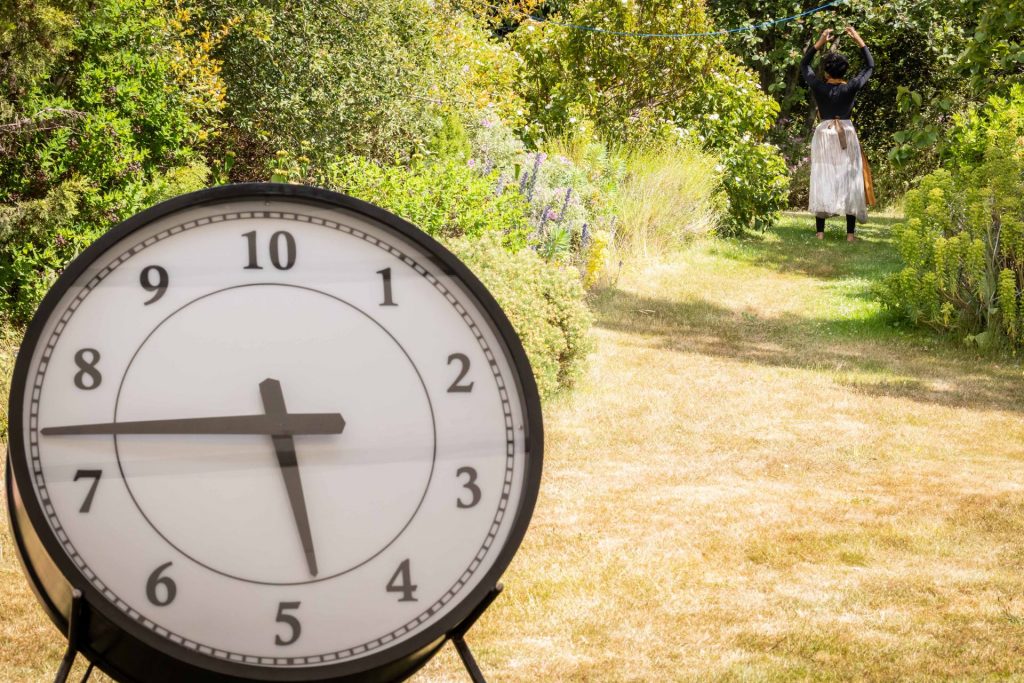
Artist Ruth Ewan also contributed her artwork ‘We Could Have Been Anything That We Wanted to Be (2011) to time the day via revolutionary decimal time.
Rabindranath X Bhose
Manifesto for a Dream Art School
Participatory Manifesto
Artist and performer Rabindranath X Bhose invited participants to manifest ideas for a future art school. Cards with prompts on their reverse were given out and responses hung between trees – accumulating thoughts and feelings throughout the day.
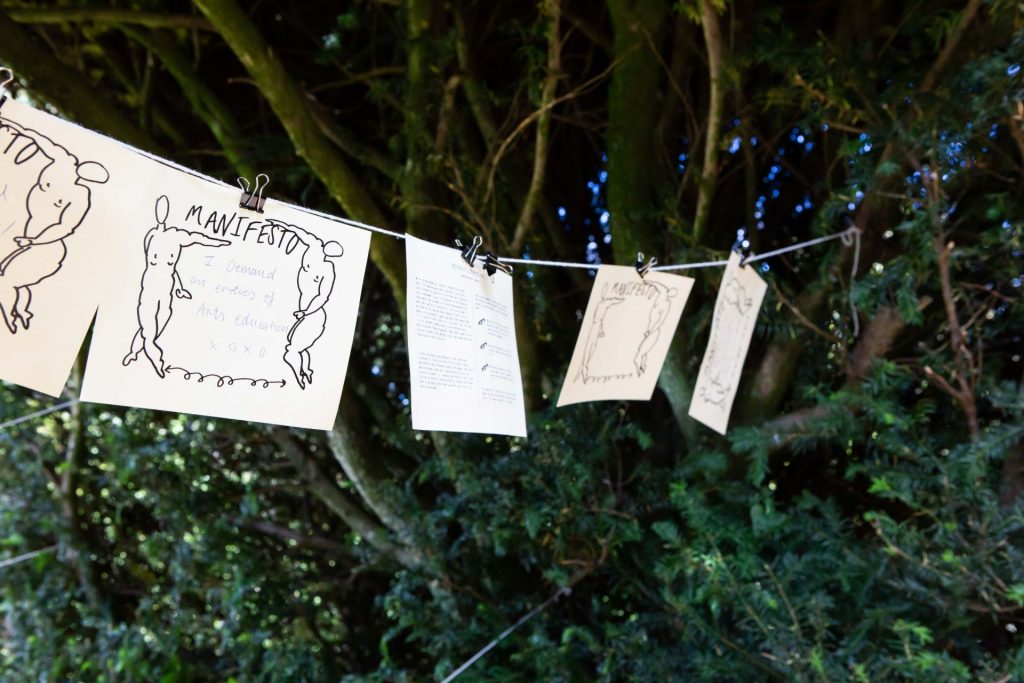
Credits
All photos by Sally Jubb. Courtesy Cooper Gallery, DJCAD.
Taken on location at University of Dundee Botanic Garden.
Image descriptions quote text written by the contributors.
